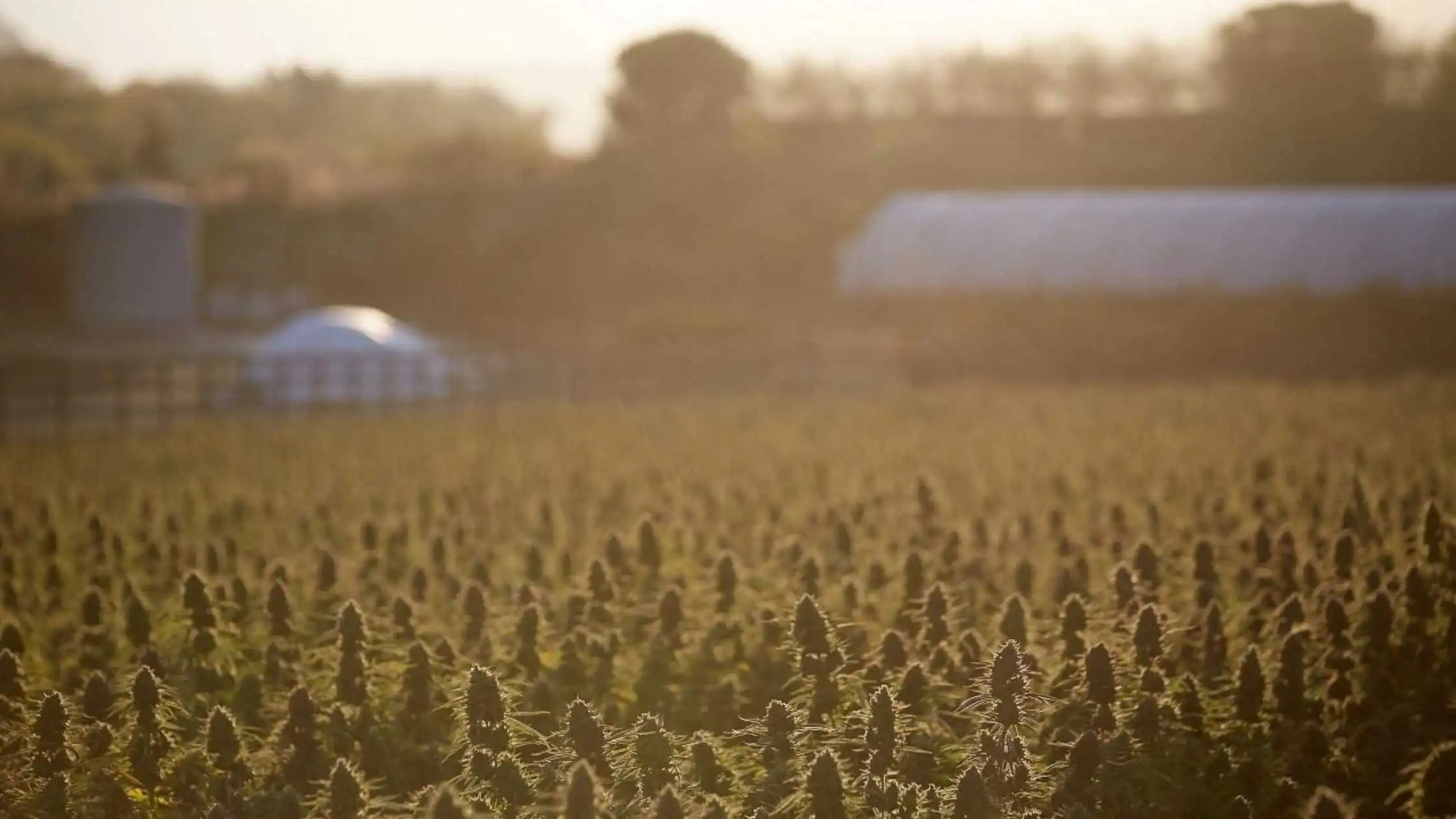The problems facing all California cannabis growers are forcing Busy Bee’s Organics in Santa Barbara County to go fallow this year. (Photo by Heather Gildroy)
Marijuana farmers across California are scrambling to revamp their operations to stay in the licensed market at a time when hundreds, if not thousands, of cultivators are in danger of going out of business.
Oversupply, high taxes, and licensing fees, as well as depressed wholesale prices, are creating cash-flow shortages for farmers across the state, according to several industry insiders who spoke with MJBizDaily.
As a result:
- Scores of farmers are opting to let costly licenses expire to save money.
- Most are trimming overhead and production, with many forgoing planting this season.
- Others are combining expertise and resources to make one final run at viability.
In a last-ditch effort to remain in the legal market, Northern California grower Mark Shaffer is partnering with Daydream Valley Farm in Mendocino County on a 10,000-square-foot grow after his single cultivation license expired in late March.
“We are going to just combine our resources to help stay alive together,” said Shaffer, owner of Shelby Ridge, a small farm in unincorporated Mendocino County, “instead of us both shutting down.”
Mass ‘extinction’?
Shaffer is among the throngs of California cultivators facing a reckoning this year, as Russia’s invasion of Ukraine has only compounded existing problems by throwing the cannabis supply chain into further turmoil.
Shaffer, for his part, is not optimistic about the outlook for cannabis farmers across the state.
“This is going to be the biggest extinction event of cannabis that we’ve seen, and it’s unavoidable,” Shaffer said.
Shelby Ridge hasn’t been profitable with wholesale prices hovering in the $250 to $300 range per pound.
Shaffer’s production costs are nearly double that per pound, causing the company to fall behind on bills and payroll.
“We’re just going to take a deep breath and cross our fingers,” Shaffer said with some lingering doubts about the new partnership.
“I don’t think it’s going to work. I see the odds stacking up against me.”
Immediate relief isn’t in sight for California growers.
And there’s little optimism for a quick turnaround because many of the challenges are systemic, requiring major policy shifts at the local and state levels.
For instance, the world’s largest marijuana market has more than 8,300 licensed cultivators in the state, yet only about 1,200 retailers, according to state records analyzed by MJBizDaily.
Overproduction is crushing the legal market, according to Ross Gordon, policy director of the Humboldt County Growers Alliance, which represents about 275 cannabis businesses.
“We have more than 2,000 acres that are licensed in California with more coming online, which is significantly more than the licensed market can handle,” he said.
Trouble in Humboldt
Mass exits in the regulated market are well underway in Humboldt County, one of the most prolific marijuana-producing regions in the world.
The county had about 900 licensed farms about a year ago, according to Gordon.
“Now there’s about 720,” he said. “It’s very clear the system we have is not sustainable for small farmers.”
Facing nearly $29,000 in annual state licensing fees and late charges, Humboldt County native Karla Knapek is preparing to let four outdoor cultivation licenses expire on April 15.
Knapek, a co-owner of Honeydew Valley Farms, cites a “lack of funds and lack of water” as the main culprits.
She has requested immediate licensing fee relief and a payment extension from state regulators as drought conditions deliver another wallop to California farmers.
In March, Honeydew received one license fee waiver.
The company has to reserve roughly $250,000 between cultivation seasons to cover county taxes, state licensing fees, and seasonal startup costs, according to Knapek, who hasn’t taken a paycheck in months.
Neither has her husband as the company eliminated all non-mandatory expenditures – including laying off three employees – after the wholesale market collapse last year.
Although Humboldt County provides a pathway for cannabis farmers to follow as a land-management tool for weathering drought and unfavorable market conditions, the state’s Department of Cannabis Control (DCC) doesn’t, she said.
As for the tax issue, a DCC spokesperson told MJBizDaily that any changes to the state tax structure require legislative action, but the agency is working on new “policies beneficial to cultivators and other cannabis businesses.”
The first three months of the year will likely be the driest in state history as drought conditions worsen.
Even if Honeydew Valley wanted to front its bill, water shortages will limit production capabilities this year.
“We’ve captured a third of the water in our rainwater catchment impoundment that we used last year,” Knapek said.
Honeydew Valley is retaining a handful of permits for greenhouse and outdoor cultivation this year.
Problems beyond Emerald Triangle
The departure isn’t limited to small farmers.
Santa Barbara County-based Busy Bee’s Organics, among the state’s largest outdoor cultivators, survived the licensing gauntlet to earn one of the state’s first annual permits.
It also survived a lawsuit tied to state environmental regulations, which cost millions to defend.
The company couldn’t recoup court costs because the plaintiff – a longtime industry opponent – filed the suit under a nonprofit entity.
Environmental lawsuits and project appeals have plagued California cannabis farmers for years.
The collapse of the wholesale market, limited retail outlets, and a thriving underground marijuana market decided to scale back and pivot easier for Busy Bee’s CEO and founder Sara Rotman.
“It creates an impossible cost-value analysis,” she said.
Her farm will go fallow this year, letting 69 cultivation licenses expire in the process.
It took Rotman seven years to acquire the permits.
The move will save Busy Bee more than $350,000 in annual licensing fees, not including related compliance costs.
The company has chosen to focus on its brand and retain its processing license to make topicals, capsules, and tinctures, among other products.
“The metrics, the financials say it’s just poor business sense to spend that kind of money when you’re earning zero money,” said Rotman, who also co-founded the Santa Barbara-based North County Farmers Guild.
Disclaimer: https://mjbizdaily.com/california-cannabis-farmers-seeking-ways-to-stay-in-business





